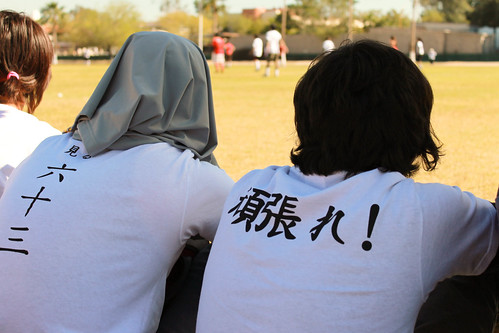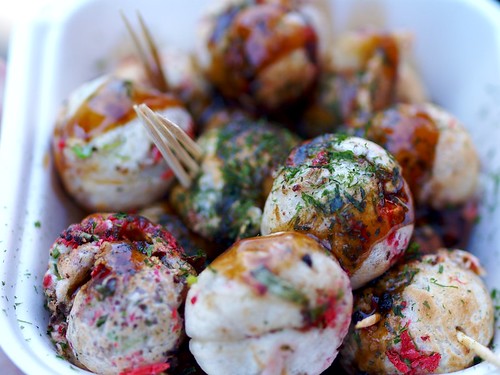Spring season signals the start of another season: baseball. The Seattle Mariners and Oakland A’s are opening their 2012 season today in Japan, and we though we’d celebrate with a Word Soup dedicated to Japanese baseball. Ready? Pure boru!
besuboru
“Now that each of the combatants in baseball’s most-storied rivalry features a Japanese superstar, the effort has begun to fuel the Sox-Yankees feud across the world in besuboru-crazy Japan.”
Jenn Abelson, “Making Sox-Yanks hit home in Japan,” Boston Globe, April 15, 2007
Besuboru is a transliteration of the English baseball. However, according to Robert Whiting in his book, You Gotta Have Wa, during World War II “American baseball terminology was banned,” and besuboru became yakyu, “fielding ball.”
doryoku
“When Japanese legend Sadaharu Oh – whose 868 home runs are out of reach even for the disgraced Barry Bonds – signs an autograph, he often precedes his name with the word ‘doryoku,’ which means ‘effort.'”
Gordon Edes, “Little League fundamentally different,” Boston Globe, March 23, 2008
Other qualities valued in Japanese baseball are nintai, “patience,” and choubatsu, “discipline.”
gaijin
“”The craziest thing about 2009 was just how everyone was standing behind a gaijin (foreign) manager, really,’ says Rubin. ‘I mean, living in Japan as a gaijin is always a little bit weird, people have a lot of prejudice against foreigners, but the Lotte fans got together and started that campaign and got that much signatures.'”
Daigo Fujiwara, “Valentine left his mark on Japanese baseball,” Boston Globe, December 8, 2011
A gaijin is a non-Japanese person. The word translates from the Japanese as “outside or foreign (gai) person (jin).” Gaikokujin is a more polite form of the word.
ganbare
“In 2007, he and his father became fans of the Dodgers’ Japanese pitcher, Takashi Saito. ‘Saito ganbare! Saito ganbare!’ they’d chant from the cheap seats. ‘Saito, let’s go! Saito, let’s go!’”
Kurt Streeter, “For Dodgers’ interpreter, his job is a thrill beyond words,” Los Angeles Times, October 2, 2009
[Photo: CC BY 2.0 by jugarsan]
Ganbare roughly translates as “hang in there,” and is said “to encourage someone who is working hard, such as running in a marathon or studying.” Also ganbatte.
gattsu pozu
“Japanese also look askance at such long-standing American baseball customs as chewing tobacco and spitting it on the dugout floor—’disgusting’ is how cleanliness-conscious Japanese players commonly describe it. [American players] find confusing the myriad unwritten rules of behavior that major leaguers have concocted to protect their all-important pride: No bunting or stealing with a big lead is one; no crowd-pleasing fist in the air (gattsu pozu) is another.”
Robert Whiting, “Lost in translation,” Sports Illustrated, March 22, 2004
Gattsu pozu is a transliteration of guts-pose, which may have less to do with guts or courage than with former world boxing champion, Guts Ishimatsu, who after winning fights “would pump his fist up and down in the air.”
homu ran
“In America they call it baseball. In Japan it’s pronounced besuboru, but the form of the game in both countries is identical: umpires, nine players, walks, strikeouts, double plays and, of course, home runs (homu ran).”
Barry Hillenbrand, “The name of the game is besuboru,” Time, September 25, 1989
Homu ran is a transliteration of home run.
[Photo: CC BY 2.0 by 50 Watts]
kyojin
“The Giants play in the Tokyo Dome, which uses enough electricity, even during day games, to power 6,000 homes. The idea of the vaunted Kyojin turning on the lights, running the air conditioning and playing baseball while residents in the surrounding Kanto region sit at home by candlelight, did not sit well with the general public.”
Robert Whiting, “After quake and tsunami, public split on baseball’s return to Japan,” Sports Illustrated, April 11, 2011
Kyojin, which translates from the Japanese as “giant person,” is another name for the Yomiuri Giants.
kokoyakyu
“[The documentary] ‘Kokoyakyu‘ (the word means high school baseball) follows two teams on their roads to Koshien.”
Anita Gates, “In ‘Kokoyakyu,’ Youth Baseball, Japanese Style,” The New York Times, July 4, 2006
While koko may seem like a reduplication, it refers to two different characters that are homonyms, 高, “high or tall,” and 校, “school.” Yakyu translates as “fielding ball.”
Kōshien
“Kōshien isn’t a word that registers on the American radar screen. But it was Kōshien — the annual site of Japan’s riveting national high school baseball tournament — that turned Daisuke Matsuzaka into a legend. When he was still just a high school senior.”
Jayson Stark, “Matsuzaka’s arrival becomes an international incident,” ESPN.com, February 15, 2007
Kōshien refers to Hanshin Koshien Stadium. Kōshien (甲子園) “comes from the Sexagenary cycle system,” where the “year of the stadium’s founding, 1924, was the first year kōshi (甲子) in the cycle.” En (園) translates as “garden or park.”
manrui homa
“On Thursday, [Matsui] sent an inside, shin-high fastball from Kyle Lohse into the right-field seats at Citizens Bank Park for his first career grand slam – ‘manrui homa’ in Japanese – and lacked only a single for the cycle.”
Annie Stapleton, “Fresh air does job for Matsui,” Boston Globe, October 6, 2007
Manrui translates from the Japanese as “full or loaded (man) bases (rui).”
[Video: CC BY 2.0 by PoiseWinsTitles]
oendan
“Each Japanese team has an oendan — a highly organized cheering block that is part regulars who travel with the team and part local fans who bring out their bass drums when their team comes to town.”
Stephen Ellsesser, “Yakyu means baseball: Fan devotion,” MLB.com, September 22, 2006
Oendan translates as “cheering squad” or “cheering section.”
pure boru
“But the best thing about the Japanese game, perhaps, is that come opening day next year, the cry of ‘Pure boru!’ is guaranteed to ring out across the land.”
Robert Whiting, “Japan Becoming the Land of the Rising Fastball,” Palm Beach Post News, October 18, 1993
Pure boru is a transliteration of play ball.
sayonara homu ran
“My personal favorite so far is the sayonara homuran (walkoff home run).”
Teddy Panos, “No matter the language, spring training is terrific time of year,” The Sun, February 13, 2007
While homu ran is a transliteration of the English home run, sayonara is Japanese for goodbye. A walk-off home run is “a home run that ends the game.”
shinjin
“Enthusiastically received during that trip were two of the Red Sox rookies (‘shinjin’ in Japanese) from the 2007 team, Daisuke Matsuzaka and Hideki Okajima, the first-ever Japanese players to join the Red Sox.”
“Rockwell and the Red Sox,” The Herald News, June 19, 2008
Shinjin translates from the Japanese as “new (shin) person (jin).” The transliterated form of rookie is rukii.
shuto
Question: “People say Matsuzaka’s slider is devastating and tops out at 90. Is that actually a cutter instead? And how about his ‘shuto’? Is it synonym of sinker in Japanese?”
Robert Whiting: “Yes on the slider. The shuto is a fast cutter and sometimes it breaks down. The Americans used to say shooter back in the 20’s.”
“Japanese baseball expert Robert Whiting’s Matsuzaka chat,” Boston Globe, November 21, 2006
Shuto is a transliteration of shooter, apparently an old name for the cutter, a fastball “that moves sideways in the air, or off the pitch, because it has been cut.”
suketto
“If gaijin have historically been asked to fit in, to surrender some part of themselves and their expectations to the experience of a new culture, on and off the field, they have also been asked, expected, to stand out. There is a Japanese term, suketto, which translates roughly to ‘helper.’ The American-born players are suketto, hired to be difference makers, to produce.”
Eric Neel, “Gaijin no longer means ‘outsider,’” ESPN.com, February 28, 2007
According to Robert Whiting in his book, The Meaning of Ichiro: The New Wave from Japan and the Transformation of Our National Pastime, the word suketto implies that “that one is there not as a member of the group but as an outsider with special skills or expertise to impart.” The term has been “applied not only to foreign ballplayers but to engineers, technicians, bond traders and others in the long string of experts Japan has employed to raise its level of competition.”
takoyaki
“More adventurous eaters might try Wann’s takoyaki; pleasingly squishy orbs of grilled octopus are sprinkled with bonito flakes that bob and ‘dance’ when heated. A popular festival food, takoyaki is served throughout Japan from temples to baseball parks.”
Eve M. Tai, “Japanese izakaya brings snacking culture to Seattle,” The Seattle Times, September 20, 2009
[Photo: CC BY 2.0 by enersauce]
Takoyaki translates as “fried (yaki) octopus (tako).” Other Japanese ballpark treats include bento boxes, soba noodles, ramen, and unusually flavored ice cream. Yakitori, which translates as “fried chicken,” refers to fried and skewered food in general, and is also known as kushiyaki, “skewer fried.”
wa
“Wa was reflected in yakyu [baseball] in other ways, like uniform playing styles, a mostly conciliatory players’ union and the paucity of player agents and heated salary disputes, even though players’ salaries were typically one-fifth to one-sixth of those of their North American counterparts.”
Robert Whiting, “The Concept of Wa,” PBS.com
Wa translates as “group harmony” and is also “the oldest recorded name of Japan.”
yakyu
“The Classic’s slogan is ‘Baseball Spoken Here.’ In this case, it’s yakyu, which in Japanese means ‘field ball.’”
“Japan Beats Cuba in First World Baseball Classic,” The New York Times, March 26, 2006
Baseball in Japan was known as besuboru till World War II when the term was changed to yakyu. Now both terms seem to be used.


